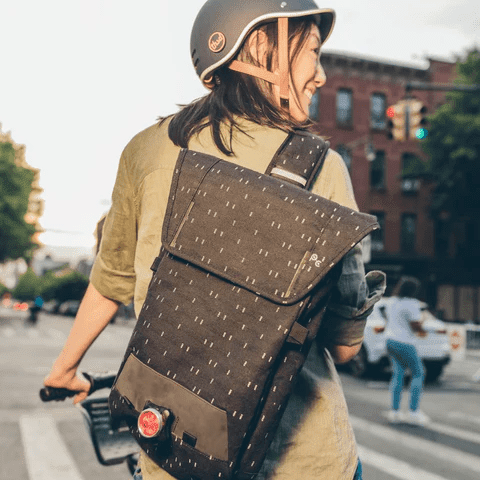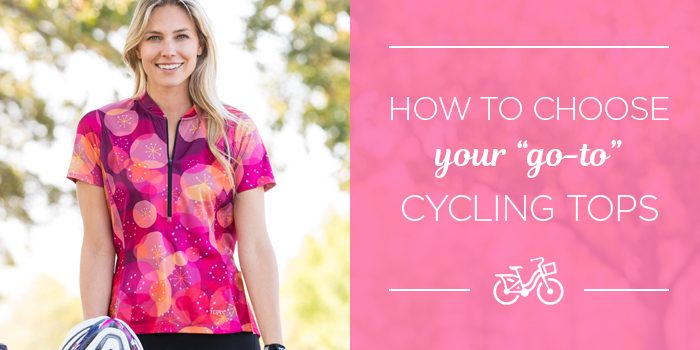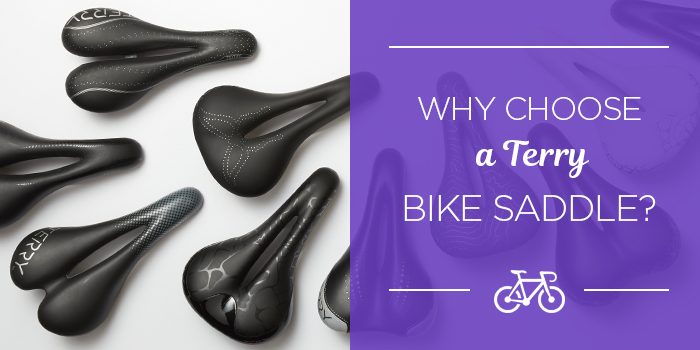Studying abroad in Germany during college, Po Campo’s founder, Maria Boustead, came to love cycling as her way of getting around. Cycling provided an eco-friendly and affordable mode of transportation while providing a little exercise and excitement along the way. The only thing missing from her riding arsenal was a bag that could carry everything from commuting to work, to meeting up with friends, to long weekend adventures—and it had to look good while doing it. Maria wasn’t seeking the same old, same old. She needed something that allowed her to confidently be herself while durably standing up to new challenges, experiences, and all that living the bike life entails. When she didn’t find a bag already on the market that fit her vision, she took to building it herself.

Once back in the US and navigating the gridded city of Chicago, Maria put her experience as an industrial designer and avid cyclist to work and founded Po Campo in 2009. The goal was to create a line of bike bags that worked (and looked) as well on the bike as they did off. No more sweaty straps, distractions, or drab and dreary colors. Her motto? #BikeAndBeFree.
Since that start, Maria has forged ahead with the belief that you shouldn’t have to sacrifice sustainability for premium design and function. She’s driven to empower people of all ages to live a more sustainable lifestyle via bicycles and scooters for transportation whenever possible. She seeks to design for alternative transportation communities across the world and her tight-knit global team works from NYC to Ho Chi Minh City to make it happen. They exist on the cutting edge of everything from trends to advocacy. In doing so, Po Campo strives to continuously evolve into a more sustainable, more functional, more inclusive, and more innovative operation. With her from the early days, we at Terry are proud to support this women-owned company and share Po Campo’s core values: Be Bold. Be Purposeful. Be Engaged. Have Fun.
Q/A With Maria
Tune in as we pick the brain of the visionary and bagabond behind the Po Campo process.
Q: How did you come up with Po Campo’s eccentric name?
MB: Well, my lawyer tells me I should say that I just liked the sounds of the syllables together. The truth is that I was reading Lonesome Dove when I first came up with the idea for Po Campo. Lonesome Dove is a western about a cattle drive and Po Campo was the cook that went on the journey. A minor character, but I liked how he did everything his own way and had kind of a salty sense of humor. I also really just liked the name, and, as a visual person, how it looked. It is very circular – you have the p, o, a, p, o – which reminded me of wheels. That’s why in our logo some of the circles are connected.
Q: How much of your personal life have you dedicated to your business since starting it?
MB: Like most entrepreneurs and small business owners, part of my brain is thinking about my business at all times. I probably have done some Po Campo work every day since starting the business in 2008. I have found that you can never really turn the lights off and clock out. It’s what I signed up for.
That said, it’s important for me to cultivate a life outside my business. I remember meeting up with an old friend a few years ago. We were catching up and she said, “okay, so what’s going on BESIDES Po Campo?” and I didn’t have much to tell her. It was kind of a wake-up call for me. Now I’m much better at separating work from not-work and enjoying, quite frankly, a richer life. Lately, I’ve gotten really into fitness and cooking to help with the aches and pains of an aging body and volunteering in my neighborhood.
Q: Your HQ is in the hubbub of NYC, right? And before that, you were based in Chicago’s west loop? You must be a very accomplished urban rider. Paint us a picture.
MB: Yes, I cut my teeth with urban riding. I found that Chicago’s grid system made it easier to devise low-stress bike routes. There would be the main thoroughfares with lots of traffic, but just one block over was a residential street that was chill. I had my favorite streets with nice tree coverage and good pavement for going pretty much everywhere I wanted to go. Chicago is also so nice and flat. I think part of the reason I started Po Campo in Chicago was that I thought it was so easy to bike there, why didn’t everyone do it?
NYC is different. I first lived in Brooklyn for a few years. It is NOT on a grid system and I found that so disorienting! I would be biking for miles the wrong way because the roads had curved. The road names also frequently change and it’s easy to lose your way. I started biking with Google maps in one ear. Eventually I also found my favorite north/south and east/west routes, streets with good bike lanes that I could take to all my favorite neighborhoods.
Now I am in Upper Manhattan and while I’ve got something of a grid system up here (yay), it is much hillier and the traffic is really intense. You have to have your wits about you! Getting an e-bike in 2020 really made biking in this area more feasible and enjoyable. Not only are the crazy hills not a deterrent (it’s called Sugar Hill and Washington Heights for a reason) but the extra juice can help me get out of a hairy situation more quickly. I’ve heard other women say how their e-bikes make them feel safer and while it’s hard to pinpoint exactly why, I totally share that sentiment.
Q: Best thing/worst thing about having your own business in the bike industry? Any advice for other entrepreneurs?
MB: Po Campo has a foot in both the bike and outdoor industries. I would say that the outdoor industry is more supportive of its founder community and upstart brands. There are showcases, pitch events, mentoring opportunities, and access to business leaders that help entrepreneurs more easily find a pathway to growth.
The bike industry is dominated by its big players like Trek and Specialized and there just isn’t much of an eco-system to support and uplift younger brands, especially brands led by women and people of color. I think this is to the detriment of the industry because not supporting new and innovative ideas only hurts its long term viability.
My advice to other entrepreneurs in the bike space is to reach out to other founders in the bike and outdoor industries for the help you need! We’re a small but mighty and helpful group.
Q: It must be hard to pick favorites, but which of your Po Campo bag(s) has your heart right now?
MB: This is a tough one! I’d say our Willis Feed Bike Bag is a recent favorite because it is just so darn useful. I’ll throw everything from snacks, to tissues, to sunglasses, big water bottle in there and I love how handy and accessible it all is. I’ve also been loving our Orchard Bike Pannier. I ride to the grocery store, hang the bag on the shopping cart, check-out, pop the bag on my bike, head home. It really holds a lot!



Q: Aside from a functional, stylish, and versatile bike bag; what do you consider to be an essential piece of riding gear?
MB: Okay, we’re coming out of winter right now so my answer will probably be different in a couple of months, but I always bike with lightweight gloves and scarf in my bag. Depending on the wind and how far I’m going, my body temp goes up and down and I really need these things to stay comfortable!
Q: Cycling through Germany while studying abroad helped inspire you to start your brand, do you have any more overseas bike trips on your horizon? How about a dream “Bike-It List” destination?
MB: I definitely have a bike-it list:
- Riding the Great Allegheny Passage (GAP) in Pennsylvania.
- Riding the Green Gourmet route in Slovenia (Adventure cycling did a story about this that made me want to go!)
- A Netherlands/Denmark tour. Last year my husband and I biked from Amsterdam to Bruges and just loved it. Honestly, I would be happy doing this every year.
Q: What is your ultimate vision for Po Campo?
MB: My vision is that one day when I look out the window, the bike lanes will be as wide as car lanes and full of people, and just about everyone will have a Po Campo something-or-other because we will be go-to brand of stylish and functional gear that makes biking a better and more seamless part of your life.
For More Fun From Po Campo
Check out breakout bike bags, now available at Terry.






Spoiler alert: Terry will be releasing a new, co-branded bag with Po Campo that will be arriving in early 2024. Be on the lookout because these bags will be limited in supply—you’ll want to get yours before they’re gone!
Po Campo’s Strides Towards Sustainability – An Overview
2018: Po Campo launched their Quest for Sustainability video series that documented the beginning of their journey to become a more sustainable company, featuring interviews with industry experts.
2019: Introduced Repreve fabric, made from 100% recycled water bottles, into their collection. The use of Repreve fibers has diverted over 25 billion water bottles from landfills and oceans. Compared to virgin polyester fibers, Repreve offsets petroleum usage, emitting fewer greenhouse gases and conserving water and energy.
2020: Eliminated all single-use polybags from their primary packaging and partnered with EcoEnclose for their polymailers which are made from 100% recycled content (50% post-consumer) and are recyclable in any stream that accepts thin film.
2021: Introduced Visi-Hemp, their proprietary blend of organic hemp, recycled polyester, and reflective yarns. This fabric is Oeko-Tex Standard 100 certified. Hemp is a renewable natural plant fiber with a long history of being used for things like ropes and heavy canvas because of its long-lasting durability. Even better, hemp needs no pesticides, herbicides or defoliants and uses far less water to produce than other natural fibers, like cotton. It grows quickly and even returns a portion of the nutrients it takes from the soil. The Recycled polyester (rPET) Po Campo uses is made from existing plastic and is a durable and versatile synthetic fiber that minimizes dependence on virgin petroleum-based materials.



2022: Switched 80% of their lining fabric to 100% recycled Repreve lining and introduced a new black exterior colorway that is a 100% Recycled Ripstop fabric. By using 100% Recycled Ripstop, they’re providing riders with ultra-functional, lightweight, tear-and-water-resistant gear while diverting textile waste from landfills.



Learn more about Po Campo on their website: https://www.pocampo.com
Follow the Po Campo Blog, Instagram, and Facebook page.








Leave a Reply